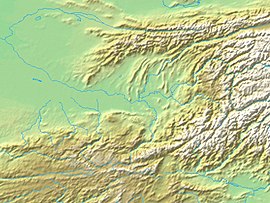| Battle of Andkhud | |||||||||
|---|---|---|---|---|---|---|---|---|---|
| Part of Khwarazmian-Ghurid wars | |||||||||
| |||||||||
| Belligerents | |||||||||
| Ghurid Empire |
Khwarazmian Empire Qara Khitai Kara-Khanid Khanate | ||||||||
| Commanders and leaders | |||||||||
|
Muhammad of Ghor (WIA) Husain Kharmil Nasiruddin Aitam † Aibak Yogi Aibak Beg |
Alauddin Khwarazm Tayangu Uthman ibn Ibrahim Taj al-Din Bilge Khan | ||||||||
| Strength | |||||||||
| 20,000 | 40,000 | ||||||||
| Casualties and losses | |||||||||
| Heavy | Unknown | ||||||||
Location of the Battle of Andkhud | |||||||||
The Battle of Andkhud, also spelt as Battle of Andkhui, alternatively known as the Catastrophe of Andkhud[1] was fought in 1204 on the bank of river Oxus near Andkhoy in present-day Afghanistan. It was fought between the Ghurid forces of Muhammad of Ghor against the Qara Khitai forces (as aid of Khwarazmian Empire) led by Tayangu of Taraz. The battle ended in a complete rout of the Ghurids, although Muhammad of Ghor managed to escape the debacle after the intervention by Uthman of Qarakhanid.
The Ghurids, soon after the death of Tekish of Khwarezm, invaded and annexed most of the Khorasan amidst the civil war among the successors of Tekish for the throne. However, the Ghurids conquests were recaptured by Alauddin Shah who made diplomatic overtures to make peace with the Ghurids. Although, the Ghurids turned down his overtures. Ghiyath al-Din Muhammad at this point, died in Herat (1203) and was succeeded by his brother Muhammad of Ghor. Alauddin soon displaced the Ghurid governor from Herat and relieved the city which lead to a full-scale invasion from Muhammad of Ghor who besieged Alauddin's capital of Gurganz. However, the Ghurids failed to press upon the siege and were forced to retreat when a large contingent of Qara Khitai and Qarakhanid forces come in aid of the Khwarazmians.
The Ghurids were chased in their retreat and in a decisive battle fought near the river of Oxus, in Andkhud, Muhammad's forces were completely routed by Qara Khitais who further chased him in his retreat as well. Muhammad was allowed to retreat safely to Ghazna after paying heavy ransom to Tayangu.
The Catastrophe of Andkhud lead to the loss of most of the Khurasan for the Ghurids and a number of their slave generals rebelled in the core Ghurid domain as well. Muhammad of Ghor, however successfully dealt with these rebellions and made preparations to avenge his defeat but was assassinated at Damyak on 15 March 1206. His successor was forced to acknowledge the suzerainty of Khwarazmians who overthrew the Ghurids by 1215 but were themselves uprooted by Genghis khan in 1221.
- ^ Habib 1981, p. 133.


